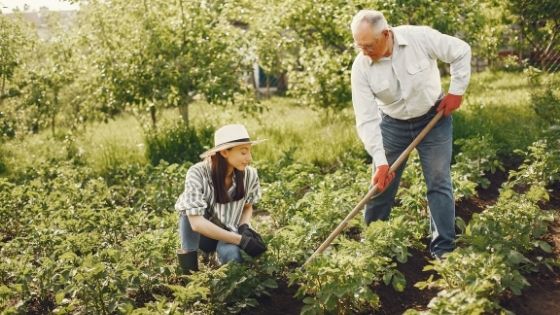Traditionally, the advantages of gardening include outdoor recreation, physical activity in the fresh air and growing organic vegetables and fruits. But in addition, this hobby brings a lot of benefits to your body, normalises the nervous system and helps to overcome stress. What other health benefits does gardening have? Here are a few scientifically proven facts.

Nutritious food
Nowadays, most products can be bought at the supermarket or market. And they are often no more expensive than ordinary homemade vegetables. However, in this case, you will not be 100% sure that you are purchasing healthy and safe products. The best and the most reliable products are self-grown products. The constant use of such vegetables and fruits in a person’s diet has a positive effect on his health.
Dealing with stress
Dutch scientists conducted a study and suggested to people experiencing severe stress two ways to deal with it – through gardening or reading. The group of subjects who got rid of increased anxiety through gardening performed much better on the task than those who chose to read. Moreover, in the “gardeners” blood was found lower levels of cortisol – a hormone of stress – than in the “readers” blood.
The researchers concluded that the hobby of outdoor gardening markedly improved the mood of the study participants and normalised their emotional background. A decrease in cortisol during gardening also has a positive effect on self-esteem: a person feels inner strength since he can influence the growth and development of plants planted by him, partially changing the environment.
Keeping joints youthful
While digging, weeding, and watering plants, a person is forced to perform various physical exercises: squats, bends, stretching, which have a beneficial effect on the health of the joints. In the absence of contraindications, this hobby is recommended for everyone who wants to prolong the youth of their joints. In addition, an important factor in working in the fresh air is exposure to sunlight, thanks to which the body forms vitamin D, which is necessary for strong bones. With a deficiency of this vitamin, a dangerous disease of osteoporosis develops. It is recommended to be in the open sun for at least 15-30 minutes a day.
Physical strength and manual dexterity
Gardening is active recreation that gradually strengthens muscles and dexterity. This advantage is important for maintaining youthfulness and mobility of the whole body. As you age, hand dexterity and strength decrease, and gardening will help you tone your limb muscles as well as sports. Several studies have been conducted in the field of rehabilitation after a stroke, which have shown that regular gardening is good for restoring the strength and physical capabilities of patients.
Communication
One of the most important benefits of gardening is definitely social interaction. Even inveterate introverts (people who are focused on their own inner world, rarely need to communicate with others), while working in the garden, chat with neighbours over the fence, and sometimes even come to visit them. Well, many elderly people often go to the garden not to plant carrots and pick apples, but to communicate with other gardeners.
Rest for the eyes
Scientists have shown that shades of green, yellow and white, related to the mid-wavelength zone of the spectrum, are best for reducing eye strain, eye fatigue, stimulating the ability of the visual analyser and increasing vision stability. These colours are most often found in nature. Therefore, the garden is a complete healing palette and rest for the eyes. Green shades have a positive effect on the functioning of the nervous system and reduce stress. But you need to make sure that your plants stay green and fresh. Don’t forget to water them regularly and HoseLink US equipment will help you with that.
Improved mood
Plants are known to evoke positive emotions in many people. Therefore, pruning trees and planting seedlings and other activities related to caring for plants can be great to cheer you up. In addition, when a person sees the results of his long and painstaking manual labour, his level of happiness hormones rises, which also has a positive effect on mood.
The normalisation of the immune system
In addition to vitamin D, which is produced in the gardener’s body by exposure to the sun, even the dirt that builds up under the nails can be of relative benefit. Scientists have found that particles of mycobacterium vacca found in the soil, when ingested with dust, fruits or vegetables, can relieve symptoms of psoriasis, allergies and asthma. This means that these bacteria in moderation can have a beneficial effect on the immune system.
Conclusion
Not everyone enjoys playing around with soil and plants, as they find it boring, tedious and messy. But in fact, gardening is a very rewarding business that supports both the physical and mental health of a person. So if you often work in the garden, you can say that you regularly go to a kind of therapy.
